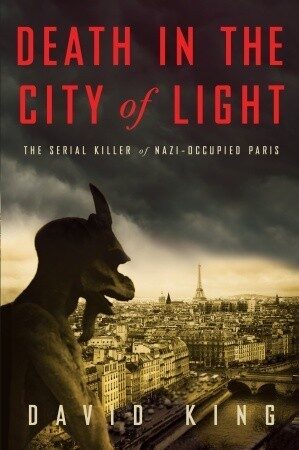
Death in the City of Light by David King is a chilling true-crime narrative set in Nazi-occupied Paris during World War II. The book tells the horrifying story of Dr. Marcel Petiot, a well-respected physician who turned out to be one of France’s most notorious serial killers. King meticulously documents the investigation into Petiot’s gruesome crimes, painting a picture of a city already traumatized by war and occupation, now shocked by the realization that a predator had been lurking within.
The story begins in March 1944 when a foul stench emanates from a townhouse at 21 Rue Le Sueur. Neighbors notify the authorities, who, upon investigation, discover body parts, bones, and other horrifying evidence of murder. The police are stunned when they realize the owner of the house is Dr. Marcel Petiot, a respected physician known for his eccentric behavior but nothing more sinister—until now.
As the investigation unravels, King leads the reader through Petiot’s terrifying exploits. It turns out that Petiot had posed as a member of the French Resistance, claiming he could help people escape the Nazis. Instead, he lured his victims into his home, promising safety, but ultimately drugging, murdering, and dismembering them. Petiot disposed of the bodies in the most grotesque ways, attempting to burn them in his home furnace or dissolve them in quicklime.
The scale of the murders is staggering. Initially, investigators believe they have uncovered a few murders, but it quickly becomes evident that Petiot’s list of victims extends well beyond what they initially feared. Over time, investigators estimate that Petiot may have killed as many as 60 people, possibly more. His victims were primarily Jewish refugees and resistance fighters desperate to flee Nazi-occupied France.
Petiot’s trial is one of the most sensational in French history. His defense is audacious—he claims that all of his victims were Nazi collaborators or double agents, and that he was acting as a patriot for France by eliminating them. This defense sparks debate across the country, with some believing him to be a hero and others condemning him as a monster. Petiot’s charisma and manipulation in the courtroom keep the public riveted.
King doesn’t just focus on Petiot’s crimes but also provides a broader view of Paris during the Nazi occupation, illustrating the fear, deprivation, and moral decay that had set in as the war dragged on. He also delves into the minds of the police, the Resistance, and the families of Petiot’s victims, painting a rich picture of a city struggling to maintain some semblance of normalcy while unraveling at the seams.
One of the fascinating elements of Death in the City of Light is how King contrasts the City of Lights’ outward beauty with the darkness lurking beneath the surface. Paris, often seen as a symbol of romance and culture, becomes the setting for unimaginable horrors. The investigation also uncovers corruption and incompetence within the police, delaying Petiot’s capture for months despite the evidence mounting against him.
Petiot’s eventual capture is almost anticlimactic. After fleeing, he is finally apprehended by the police while trying to pass himself off as a French soldier. His trial is as dramatic as expected, with Petiot delivering bold claims of his innocence and defiance to the very end. However, the overwhelming evidence leads to his conviction for 27 counts of murder, though many believe the real number to be far higher.
In 1946, Petiot is executed by guillotine, marking the end of one of France’s darkest chapters. King’s narrative offers no simple resolution. Even after his death, the mystery surrounding Petiot persists—what drove him to commit such horrific crimes? Was he truly insane, or was his evil more calculated than anyone could comprehend?
King’s meticulously researched and haunting account of Dr. Marcel Petiot’s killing spree captures not only the horrific nature of his crimes but also the way they reflected the larger horrors of the war. It’s a book that shows how one man’s evil was able to fester and flourish in a time of chaos, leaving a legacy that continues to haunt those who remember.
Review:
David King’s Death in the City of Light has been lauded for its masterful storytelling and thorough research. King does an excellent job balancing the crime details with the historical backdrop of Nazi-occupied Paris, painting a vivid picture of the fear and desperation of the time. The pacing of the book, despite the grim subject matter, is engaging and often reads like a thriller, though it is deeply rooted in fact.
Critics have praised King for his ability to humanize both Petiot’s victims and the investigators who worked tirelessly to bring him to justice. His portrait of Petiot is equally compelling—he is depicted not as a one-dimensional monster but as a complex figure, charming and sinister in equal measure. King leaves enough ambiguity for the reader to wonder whether Petiot truly believed his own twisted justifications or whether he was merely a manipulative psychopath.
The book’s one potential weakness lies in the difficulty of fully understanding Petiot’s motivations. While King provides a wealth of detail about Petiot’s life and crimes, the true nature of his psyche remains elusive, which may frustrate readers looking for concrete answers. Nonetheless, Death in the City of Light offers a gripping and insightful look into one of France’s most notorious criminal cases, framed by the greater horrors of World War II.
Read the Full Novel Here
Death in the City of Light: The Serial Killer of Nazi-Occupied Paris by David King | Goodreads
About the Author:
David King is an American author and historian known for his rigorous research and engaging narrative style. With a background in European history, King has written several acclaimed historical works, including Vienna 1814 and Finding Atlantis. His writing focuses on significant but often overlooked moments in history, with a particular interest in crime, politics, and the darker side of human behavior. King’s ability to bring history to life with vivid detail and suspense makes his works both educational and captivating. He has taught European history at the University of Kentucky and continues to write historical non-fiction that resonates with a wide audience.
Explore Related Ebook Novels
- Read Thunder Song by Sasha LaPointe eBook Review
- Read I Finally Bought Some Jordans by Arceneaux Summary
- Read Promised to the Alpha Ebook Free Here
- Read “A Breeder: For The Alpha” Ebook Free Here


